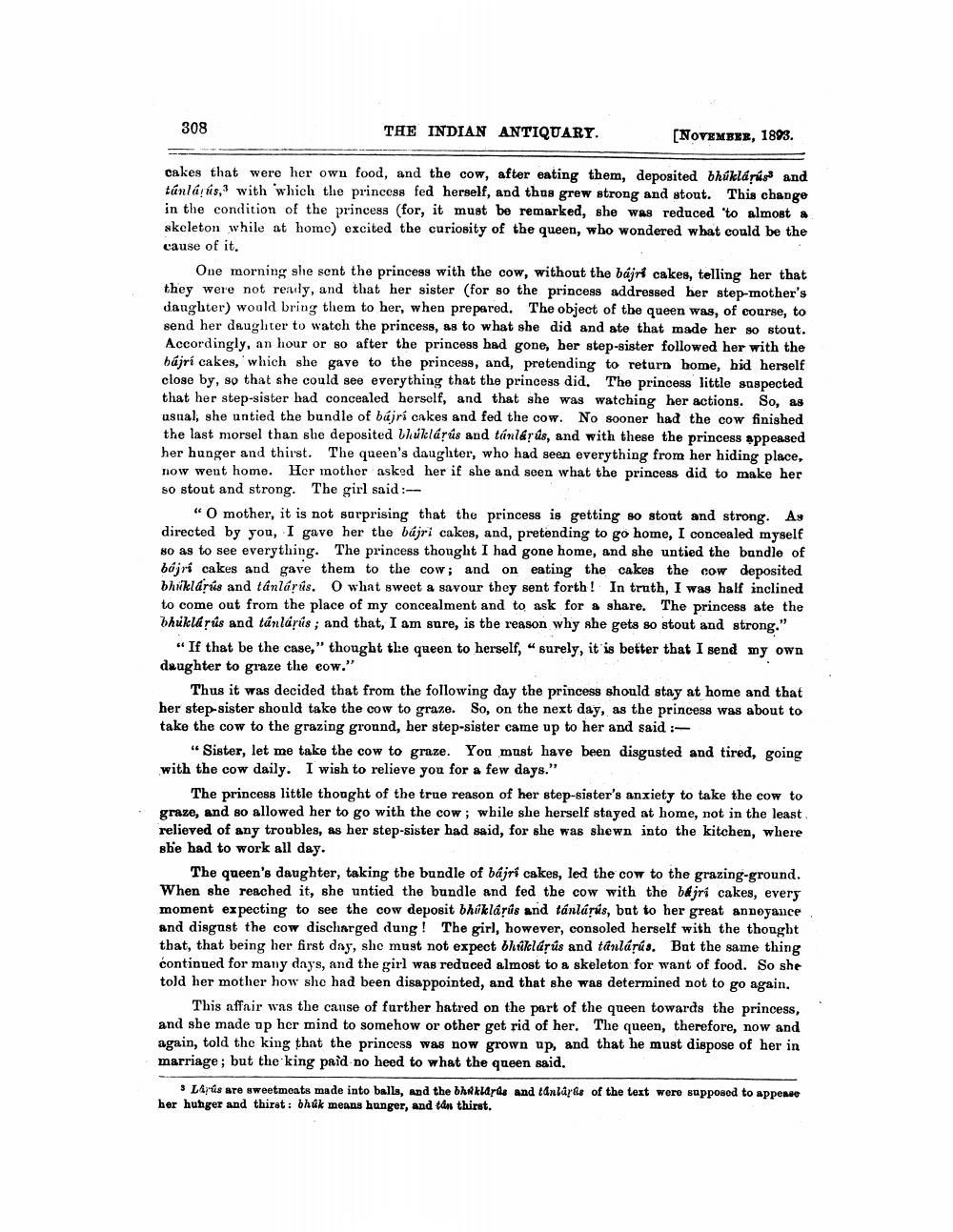________________
308
THE INDIAN ANTIQUARY.
[NOVEMBER, 1893.
cakes that were her own food, and the cow, after eating them, deposited bhuklásús) and tánláriis, with which the princess fed herself, and thus grew strong and stout. This change in the condition of the princess (for, it must be remarked, she was reduced to almost a skeleton while at homo) oxcited the curiosity of the queen, who wondered what could be the cause of it.
One morning she sent the princess with the cow, without the bájri cakes, telling her that they were not ready, and that her sister (for so the princess addressed her step-mother's daughter) would bring them to her, when prepared. The object of the queen was, of course, to send her daughter to watch the princess, as to what she did and ate that made her so stout. Accordingly, an hour or so after the princess had gone, ber step-sister followed her with the bájri cakes, which she gave to the princess, and, pretending to return home, hid herself close by, so that she could see everything that the princess did. The princess little suspected that her step-sister had concealed herself, and that she was watching her actions. So, as usual, she untied the bundle of bújrí cakes and fed the cow. No sooner had the cow finished the last morsel than she deposited Wuklárús and tánlarús, and with these the princess appeased her hunger and thirst. The queen's daughter, who had seen everything from her hiding place, now went home. Her mother asked her if she and seen what the princess did to make her so stout and strong. The girl said :
“O mother, it is not surprising that the princess is getting so stout and strong. As directed by you, I gave her the bújri cakes, and, pretending to go home, I concealed myself so as to see everything. The princess thought I had gone home, and she untied the bundle of bájri cakes and gave them to the cow; and on eating the cakes the cow deposited bhiklarus and tânláris. O what sweet a savour they sent forth! In truth, I was half inclined to come out from the place of my concealment and to ask for a share. The princess ate the bhuklásús and tánláris; and that, I am sure, is the reason why she gets so stout and strong."
" If that be the case," thought the queen to herself,“ surely, it is better that I send my own daughter to graze the cow."
Thus it was decided that from the following day the princess should stay at home and that her step-sister should take the cow to graze. So, on the next day, as the princess was about to take the cow to the grazing ground, her step-sister came up to her and said :
"Sister, let me take the cow to graze. You must have been disgusted and tired, going with the cow daily. I wish to relieve you for a few days."
The princess little thought of the true reason of her step-sister's anxiety to take the cow to graze, and so allowed her to go with the cow; while she herself stayed at home, not in the least relieved of any troubles, as her step-sister had said, for she was shewn into the kitchen, where she had to work all day.
The queen's daughter, taking the bundle of bájri cakes, led the cow to the grazing-ground. When she reached it, she untied the bundle and fed the cow with the b&jrí cakes, every moment expecting to see the cow deposit bhéklárûs and tánlásús, but to her great annoyance and disgust the cow discharged dung! The girl, however, consoled herself with the thought that, that being her first day, she must not expect bhtiklásús and tânlásús. But the same thing continued for many days, and the girl was reduced almost to a skeleton for want of food. So she told her mother how she had been disappointed, and that she was determined not to go again.
This affair was the cause of further hatred on the part of the queen towards the princess, and she made up her mind to somehow or other get rid of her. The queen, therefore, now and again, told the king that the princess was now grown up, and that he must dispose of her in marriage; but the king paid no heed to what the queen said.
LArús are sweetmeats made into balls, and the bhaklards and anbarls of the text were supposed to appeare her hunger and thirst: bhûk means hunger, and tán thirst.




